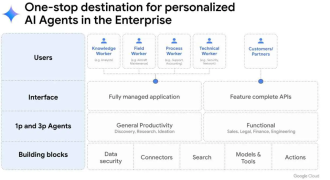
As businesses adjust to remote and hybrid work models, communication and collaboration tools become even more critical to success. In this setting, unified communications as a service, or UCaaS, enables employees to communicate from any location and any device. It encompasses various communication methods, including voice, video, text, messaging and social media, and is designed to be both cost- and labor-efficient.
RingCentral, which offers enterprise-grade cloud communications, video conferencing and contact center solutions, touts itself as the largest and fastest growing pure-play UCaaS vendor. This week, RingCentral announced two important partnerships—one with AWS, the other with Avaya. Let's dive into those announcements and explore what they mean for RingCentral.
Amazon Web Services answers the call
RingCentral has entered into a strategic collaboration with Amazon Web Services (AWS) to help companies expedite their cloud implementations and transform their customer and employee communications. Under this multi-year partnership, AWS will provide its customers with access to RingCentral MVP (Message Video Phone) and RingCentral Contact Center—unified communications platforms that integrate team messaging and video meetings with a top-performing cloud-based phone system. AWS will also provide customer access to RingCentral's Contact Center solution.
"This announcement with AWS marks the beginning of an important collaboration for RingCentral, whereby we will work together to deliver technologies and innovations that improve business communications for today's hybrid workforce of both knowledge workers and front liners," said Mo Katibeh, president and chief operating officer at RingCentral. He went on to say that the partnership will match RingCentral's business communication service with "the unmatched security, compute power, data residency and privacy of AWS."
Avaya Cloud Office
Meanwhile, RingCentral and Avaya have extended their multi-year partnership, which now includes minimum seat commitments and a better-aligned incentive structure to accelerate migration to Avaya Cloud Office (ACO). The deal benefits RingCentral because Avaya will be compensated only as ACO seats are sold, with no commissions needing to be prepaid by RingCentral.
The terms of the expanded agreement aim to unlock further opportunities for RingCentral and Avaya to maximize customer value. The partnership has also expanded to include additional go-to-market models that enable Avaya to sell ACO directly to its installed base.
ACO allows companies to connect their office, remote and mobile workers to a single system so they can collaborate from anywhere on any device—without needing to switch back and forth between platforms to get things done. More than 200 third-party apps such as Jira, Marketo and PagerDuty are pre-integrated to help achieve this.
ACO is available in 15 billing countries and can be extended to more than 40 countries through the Global Office feature. The system provides an all-in-one calling, meeting and messaging solution with incoming call numbers (local or toll-free) for over 100 different countries. Operationally, this allows for cross-border communication with employees and customers regardless of device and on a single bill.
The two companies also said that they plan to make additional investments to further differentiate ACO and expand its integration with other Avaya products.
Wall Street's reaction and RingCentral’s optimism
These two important partnership deals on top of a quarterly earnings announcement made for a wild ride this week for RingCentral this week. After the AWS announcement on Wednesday, the stock got a bump—up roughly 7%. However, it then dropped around 20 % after the company provided guidance for 2023 that missed Wall Street’s growth expectations. Avaya's Chapter 11 bankruptcy filing this week likely added to the mixed results for RingCentral, although the two companies seemed to have reached a solid resolution despite Avaya’s restructuring.
Vlad Shmunis, RingCentral's founder, chairman and CEO, explained why he is not worried: "As part of its recapitalization, Avaya is emerging stronger and better positioned to migrate the world's largest on-premises installed base to Avaya Cloud Office by RingCentral, the best UCaaS destination for every Avaya Unified Communications customer."
Shumis was confident in this week's earnings call, stating, “We are in a select category of SaaS companies with over $2 billion of recurring revenue, and our Q4 results reflect our ability to deliver healthy growth and increasing profitability as we continue to scale,” he said. “We are executing well in the current environment given our product leadership, which provides customers with the market's leading UCaaS platform, as well as an integrated CCaaS solution.” (CCaaS means “contact center as a service.”)
Cloudy and mostly sunny outlook ahead
Providing cloud-based communication and collaboration tools to workforces will continue to be a priority for many companies. Employees increasingly demand flexibility and are willing to trade jobs to work for companies that offer it. At the same time, employers benefit from supporting remote work by accessing a wider talent pool. Ultimately, with the cloud's reliability and scalability, employees and customers can collaborate in new ways, empowering a more diverse workforce from nearly anywhere with minimal operational lift.
RingCentral benefits from this trend because it is the market leader in the highly fragmented UCaaS space, where it continues to grow. With the help of channel partnerships like the ones announced this week, RingCentral continues to expand beyond its initial successes in the small and medium business market to serve more and more larger companies.
Final message
RingCentral continues to lead in this space but will need to stay competitive and transparent with its pricing. This is particularly relevant because last year the company changed its SMS overage charges in response to changes in FCC guidelines. In addition, while its videoconferencing features are robust, many of the company's bells-and-whistles features are reserved for higher-paying customers—but that’s not always conveyed clearly. To take one example, RingCentral needs to clarify its webinar pricing at higher attendance levels.
The new partnership with AWS and the now more favorable relationship with Avaya support RingCentral’s strong positioning to execute and deliver healthy growth. However, there is no doubt that 2023 will see many customers that are wary about economic conditions shop around for better deals as they try to reduce costs and the number of vendors they must deal with. Additionally, per-seat pricing models may suffer a bit in larger enterprises that have pink-slipped a significant number of staff.
Even with these challenges—and the bumpy ride taken by its shares this week—RingCentral looks poised to make the most of its new partnerships in 2023 and beyond.























































































